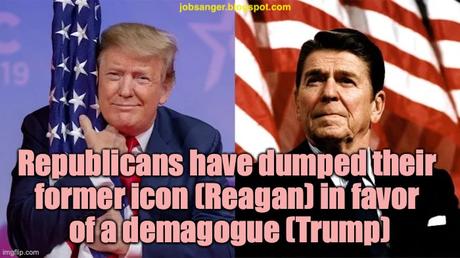
Prior to 2016, the hero of the Republican Party was Ronald Reagan. He was the politician that every Republican official claimed to be copying. But that was yesterday. Today, Republicans have a new hero. In effect, they have dumped Reagan for Donald Trump.
The following is part of an op-ed byAlbert Hunt (formerly of Bloomberg News and the Wall Street Journal) in The Hill:
The choice between Elise Stefanik and Liz Cheney for a House Republican leadership post serves as a proxy war between Donald Trump and Ronald Reagan for the soul of the Party.
Reagan and Cheney — and Republicans generally — appear certain to be the losers.
For decades after he left office, Ronald Reagan was a glue that united Republicans, just as Franklin D. Roosevelt was for Democrats. Now Trump dominates the Republican Party; Liz Cheney had the audacity to tell the truth: that Trump lost the last election, which many of her House GOP colleagues are too cowardly to acknowledge.
There are many casualties of Trump; for Republicans, Reagan as an icon is one.
It's not that politicians today harken back to the Reagan policies or governance. It's that he personified a forward-looking, can-do conservatism. Trump personifies a dark, vitriolic negativism. It's the “American carnage” of Trump's inaugural speech versus the “shining city on the hill,” the Gipper's favorite description of the country.
Lou Cannon, the definitive Reagan biographer and journalist extraordinaire, says the contrast between these two presidents is stark: “Trump is Reagan in reverse. He has destroyed the sense of optimism and confidence” conveyed by the 40th president.
For me this isn't revisionism. I believe some of Reagan's domestic policies were deeply flawed, often rewarding the undeserving rich and insensitive to the struggles of many Americans. His Justice Department was almost as bad as Trump's — until Dick Thornburgh was tapped in the final months. The Reagan legacy on the domestic front is thin.
But as Cannon has so eloquently written, Reagan's brand was a positive, affirmative conservatism, even if you disagreed with the policies. For a quarter century after the Gipper left office, candidates — from state legislative races to Congress to presidential elections — identified as Reagan Republicans. John McCain and Mitt Romney, the two GOP nominees before Trump, during their campaigns were self-styled Reaganites. . . .
Both governed basically as conservatives — Reagan out of conviction; there still were big differences. Trump was an immigration-basher from the get-go. In his last presidential debate, in 1984, Reagan said: “I believe in the idea of amnesty for those who have put down roots and lived here, even though sometime back they may have entered illegally.” He spoke often of the value of immigrants, signing the 1986 bill that granted partial amnesty.
Reagan also could acknowledge mistakes; he made his share. The most famous was after consistently denying his administration traded arms to Iran for hostages, a report proved that untrue: “A few months ago I told the American people I did not trade arms for hostages,” he declared. “My heart and my best intentions still tell me that is true. But the facts and evidence tell me it is not.”
Trump believes contrition is for losers.
Trump Republicans and many conservatives embrace the big lie that the election was “stolen.” Some may believe it; others fear incurring the wrath of Trump. Witness the parade of the likes of House GOP leader Kevin McCarthy and Texas Sen. Ted Cruz to kiss the ring of the 2020 election loser. . . .
Lou Cannon told me he fears this may be an enduring change for the party of Reagan: “Once Republicans check in their principles and values and say truth is whatever Trump says it is, it’s not easy to come back.”
The Democrats still invoke FDR three quarters of a century after his death. For Republicans, Trump has made the party of Reagan yesteryear.

